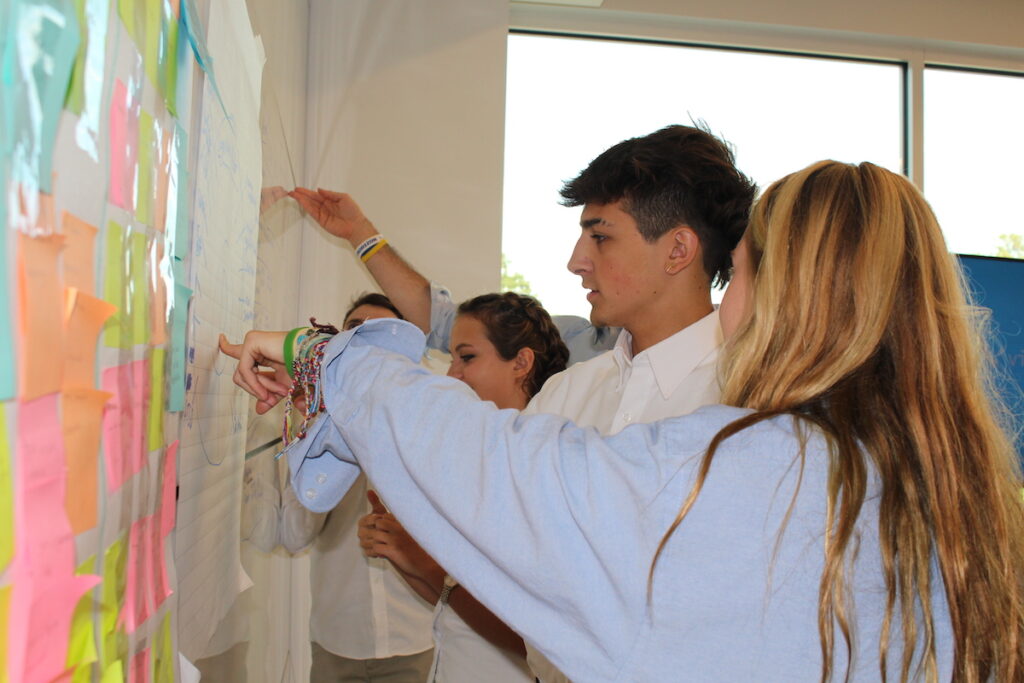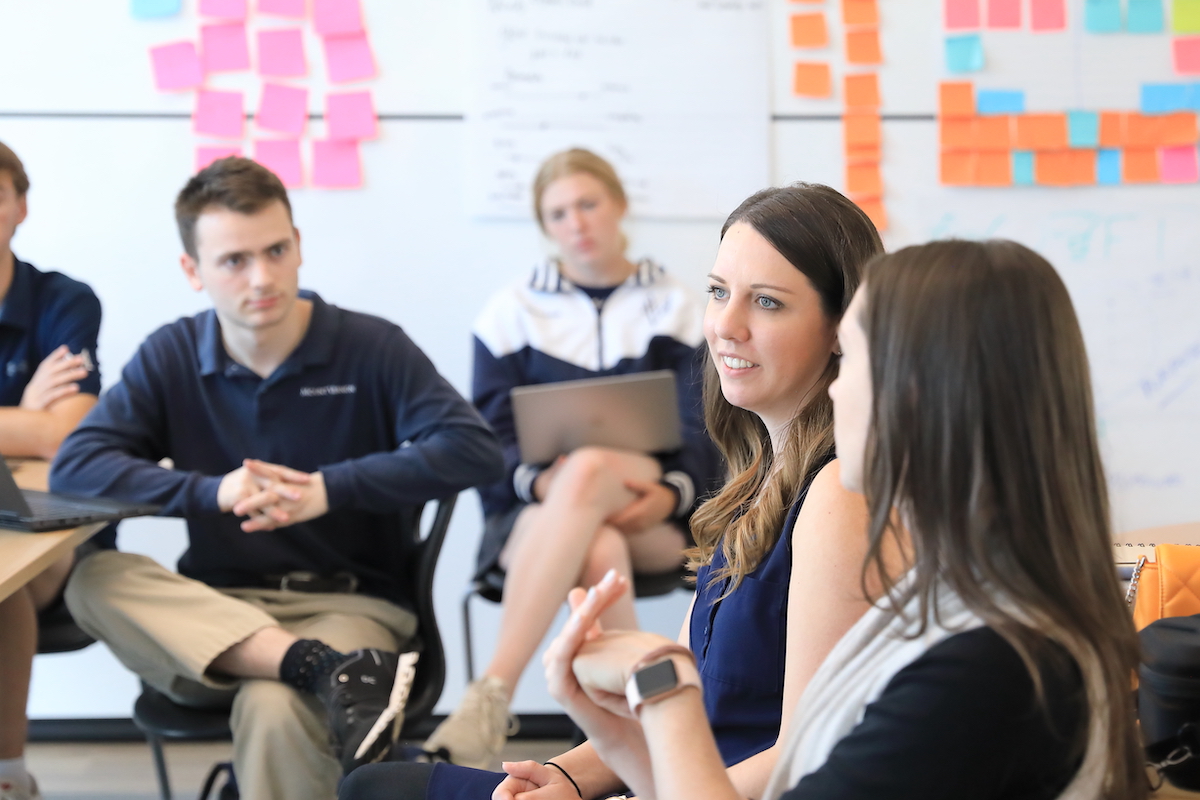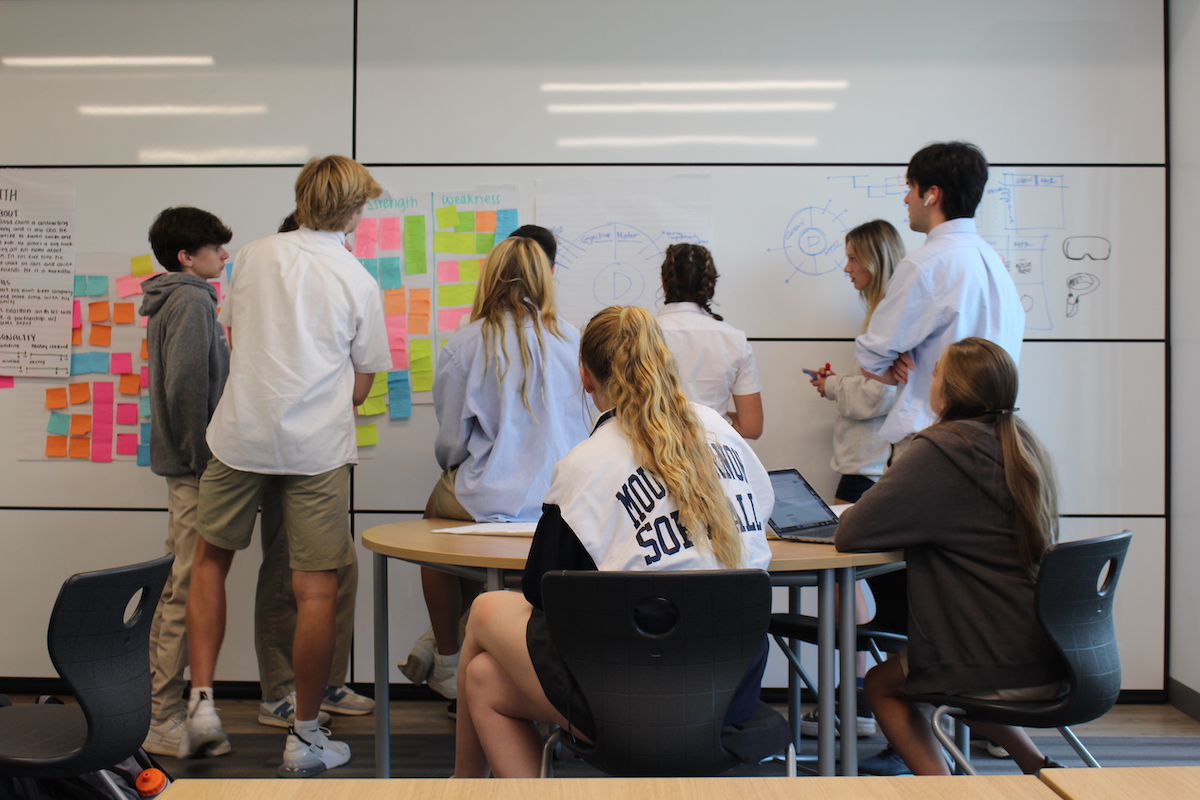Futurus is an Atlanta-based immersive technology production company, specializing in emerging technology consulting, road mapping, virtual reality (VR) simulations, augmented reality (AR) development, and interactive event experiences. The team works with brands to produce long-term scalable plans and create immersive experiences for training, marketing, storytelling, and visualization use cases.
While delivering client-focused solutions, the company is required to visualize possible futures and translate them into current experiences. That requires the ability to envision the future and to be innovative enough to imagine possible solutions, two distinctive elements that define Mount Vernon’s Innovation Diploma program.
In MOD 1, Futurus partnered with an Innovation Diploma (iD) class made up of juniors and seniors to design solutions that address inclusivity and accessibility to virtual reality (VR) experiences for audiences with various levels of motor and cognitive functioning. Early in the project, students identified the needs to be two-fold.
- To successfully address the question of how they might create more engaging, effective, and safe VR experiences for all types of audiences.
- Make a solution that could easily be embedded into the Futurus design process.
As a four-year program, iD allows students to engage in real-world work. By collaborating with external partners, students create long-term professional relationships, facilitate positive change in partnered organizations and communities, and have an active role in changing the world around them.
When initiating the project with Futurus, students addressed the following:
- What is our partner interested in improving? (Discovering the area of concern)
- What are we solving for, and why is it relevant? (Defining the opportunity)
- How are we going about it, and what are we creating? (Designing solution paths)
- What value have we generated for our partner(s)? (Deploying actionable solutions)
Discovering The Area of Concern: What are you interested in improving?
While virtual reality is meant to provide an enhanced digital experience, users with disabilities experience a constrained interaction that creates an impediment to enjoying its full benefits. Futurus wants to be inclusive with its products by designing them so that people with physical and cognitive disabilities can use them with ease.

Defining The Opportunity: What are we solving for, and why is it relevant?
The team started diving deeper into some of the specific disabilities of Futurus’ end users. “Instead of looking at overarching disabilities such as Autism Spectrum Disorder, we looked at specific challenges such as the inability to move controls with your hands, hear, sit, or stand,” Grace Gilmore, Class of 2023, explained.
Futurus is a company that, among other experiences, designs games, architectural walk thoughts, and factory training experiences. “Many things they do should not require full use of some body parts. For example, many people that do not use their hands still want to play VR video games. Our job is to imagine different ways we can accommodate someone that can’t use their hands. What does that look like? One possible solution is to program the VR headset to move your character wherever your eyes look. You could also program the headset to move your character to wherever you turn your head. But then there are issues with that. There is no perfect solution for the question Futurus has asked us, but we have answers for case-by-case questions.” Claire Davis, Class of 2024, pointed out.
Designing Solution Paths: How are we going about it, and what are we creating?
Students explained their thought processes to the Professor of Data Science from Georgia Tech, Dr. Chuck Easley, and his graduate student Utibeno Ekpoudom, an Industrial Engineer. “They optimize processes which is what we are doing. We want to make VR more accessible but don’t want to hinder the VR process. We asked them what they would do if given this problem, and they validated what we have been doing.” Barrett Riley, Class of 2023, explained, “If these people from Georgia Tech like what we are doing, it’s a good sign that we are doing it correctly.”
After the midpoint progress report with Futurus, iD students had clarity about how they were to present their findings to their partners. “When we got feedback, we knew what we needed to do. We were focusing on too small of a scale. They were looking for a way to implement the solutions from project to project”, something like an ‘if-then’ document,” explained Stephan Yazinski, Class of 2024.
Deploying Actionable Solutions: What value have we generated for our partner?
At their following meeting with Futurus, students presented documents designed for the partner’s storyboarding, art, and developers teams with ideas on how they could create experiences for people with different disabilities. Since this was their second to last meeting with the company, the iD Team was looking for specific feedback regarding the work they had done so far, as well as the most effective way to present it. The goal for the meeting was to dial-in and maximize the benefit of the work product by making it readily accessible for the Futurus development team. The last push was demanding and required students to focus on how to present their work to their partners.
The final presentation to Futurus took place the following week. After an intense immersion to visualize and incorporate the solution into Futurus workflow, students developed an accessible framework embedded in the company’s preferred project management tool, Confluence. All the required documentation was linked to the partner’s Google Drive and lived with the partner’s project management system. Amy Stout, COO, Annie Eaton, CEO, and Elijah Claude, XR Design Strategist, from Futurus, attended the final presentation at Mount Vernon. They were very excited about the results, and later on, Amy Stout shared Futurus’ sentiment regarding the experience of innovating with our students with Eduardo Milrud, Ph.D. Director of Innovation Diploma and User Experience, “It’s been a pleasure working with you and your students over the past few months. We look forward to taking the solution they created and implementing it into our production process. Having this guide to turn to while designing future virtual reality experiences will be instrumental in ensuring what we create accessible programs for more people to enjoy.”
As later described by Dr. Milrud, the Futurus project posed a new challenge for students: to work on a different order of innovation and design; namely, to understand the intrinsic dynamic and workflow of the partner and create a design solution that dovetailed with their creative process and workflow.
Students valued the learning experience. “This was a new experience for the iD team.” Bennett Riley, Class of 2023, has enjoyed the project even though he had some concerns about it initially: “We mostly make physical products or websites for our partners. This is more nuanced. This is not clear-cut. It has been a lot of prototyping and going back and forth with the client. I think it was a learning experience in that we needed a complete understanding of what the client wanted before we started prototyping.”
___________________________
Explore more Innovation Diploma successes on their website, Instagram, and Twitter.


